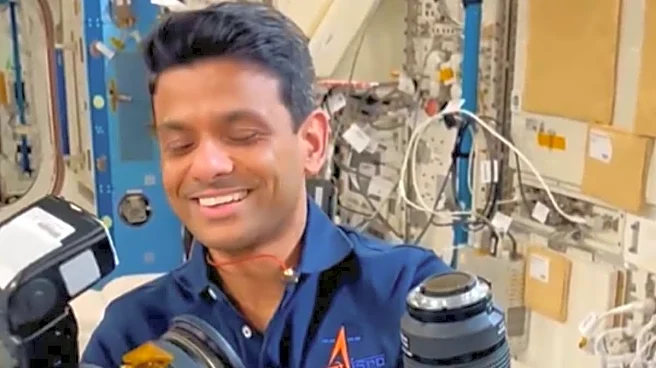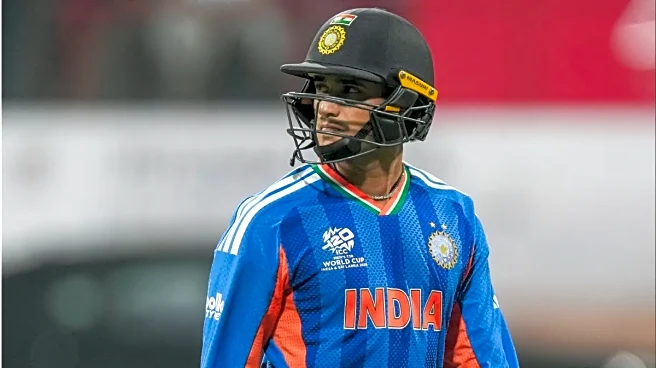Group Captain Shubhanshu Shukla, India’s first astronaut to visit the International Space Station (ISS) on the Axiom-4 mission, gave a fascinating glimpse into life in orbit. Sharing a video on X (formerly Twitter), he used a simple experiment to explain why astronauts appear weightless in space. In the clip, he demonstrates changing a camera lens aboard the ISS.
When he first arrived at the ISS, Shukla admitted he was unsure how objects would behave in space.
“Believe it or not—everything you see in this frame is falling. When I first reached the International Space Station, I had this strange hesitation: if I let go of something, won’t it just fall? On Earth, that’s exactly what happens. In space, though, my early instinct was to politely hand
over items to crew-mates… instead of just releasing them. The funny part? They were just as cautious at first—so we ended up passing things around like an overly careful game of “hot potato,” he explained in a note shared along with the video.
Why Nothing Falls In Space? Shubhanshu Shukla Explains
The footage shows how, despite letting go of the camera lens, it doesn’t fall to the ground but instead floats. The reason behind this floating effect is simple yet mind-bending.
“Nothing actually falls away in orbit. As you see in this video, if I let go of the lens, it doesn’t drop—it hovers. Why? Because both the lens and I are falling at the same speed around Earth. No relative falling = no ‘down,’” Shukla wrote. He also connected this to Isaac Newton’s famous thought experiment: toss a ball from a high mountain.
“Toss it gently—it arcs down nearby. Throw harder—it travels farther before dropping. Throw it so fast that as it falls, Earth’s surface curves away beneath it? The rate of drop matches the curvature of the Earth. Congratulations—you’ve just put that ball in orbit. It’s falling forever, but it never hits the ground,” the post stated.
‘Astronauts Don’t Feel Weightless’
Shukla clarified a common misconception about astronauts feeling weightless. “Astronauts don’t feel weightless because gravity has disappeared—gravity up here is still about 90 per cent as strong as at Earth’s surface. We feel weightless because we and everything around us are constantly falling together. Floating in space is really just falling—forever,” he wrote.
See The Post Here
Believe it or not- Everything you see in this frame is falling. 😅
When I first reached the International Space Station, I had this strange hesitation: if I let go of something, won’t it just fall? On Earth, that’s exactly what happens. In space, though, my early instinct was to… pic.twitter.com/odCq0Dh8Xy
— Shubhanshu Shukla (@gagan_shux) September 23, 2025
How People Reacted Online
Since being shared online, the clip has garnered more than three lakh views and a wave of reactions in the comments section. Let’s take a look at some of them.
One user commented, “Wild to think that astronauts aren’t escaping gravity at all, they’re just falling at the same speed as everything else. Orbit is basically Earth’s longest rollercoaster ride that never ends.”
Another said, “In other words, it’s the curved space-time that surrounds the curvature of the earth due to the presence of such a huge mass i.e., the earth. The entire space-craft, all the astronauts and the non-living things in it, are traversing the curved space-time around the earth i.e. the orbit.”
“Understanding that orbit is simply perpetual free-fall turns space from a science fact into pure magic—Newton would be thrilled!” a viewer wrote.
Someone remarked, “Mind-blowing! Floating in space isn’t magic it’s perpetual free fall. Everything around you ‘falls together,’ which is why astronauts seem weightless. Newton would be proud!”
“Amazing. How falling can still mean staying up,” read another comment.
Shubhanshu Shukla’s Space Journey
Shukla embarked on his journey aboard the SpaceX Dragon spacecraft from NASA’s Kennedy Space Centre on June 25. After spending several weeks aboard ISS, he safely returned to Earth on July 15 and arrived back in India on August 17. At a press meet, he shared that the insights and knowledge he gained during his time in space will be valuable for India’s upcoming Gaganyaan mission.


/images/ppid_59c68470-image-177073507763571006.webp)
/images/ppid_59c68470-image-177073507927493167.webp)
/images/ppid_59c68470-image-177073504502237506.webp)

/images/ppid_59c68470-image-177073753137529509.webp)

/images/ppid_59c68470-image-177073753953128063.webp)









